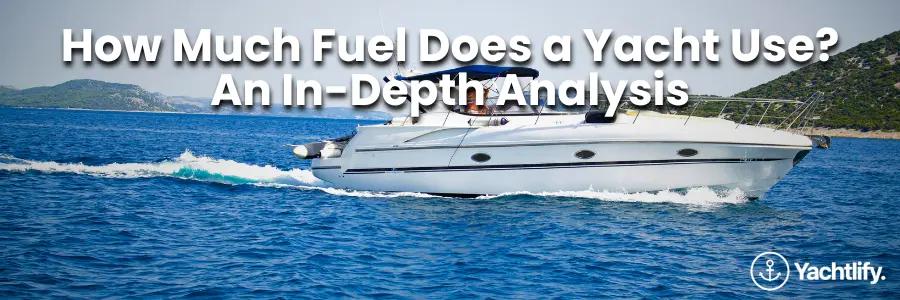How Much Fuel Does a Yacht Use? An In-Depth Analysis

When it comes to luxury and adventure on the high seas, yachts are the epitome of both. Whether you’re a yacht owner or dreaming of chartering one for your next vacation, understanding the fuel consumption of these majestic vessels is crucial. Fuel usage not only impacts the cost of your journey but also has environmental implications. In this article, we dive into the factors affecting yacht fuel consumption and provide insights to help you estimate how much fuel a yacht uses.
Understanding Yacht Fuel Consumption
Fuel consumption in yachts is influenced by several factors, including the yacht’s size, engine type, cruising speed, and conditions at sea. Here, we break down these elements to give you a clearer picture.
Yacht Size and Engine Type
Yachts come in various sizes, from smaller 40-foot models to massive 100-foot plus luxury liners. Generally, the larger the yacht, the more fuel it consumes. Engine type also plays a significant role. Traditional diesel engines are common, but newer models may feature more efficient or hybrid engines that can impact fuel usage.
Cruising Speed
Speed is a significant factor in fuel consumption. Higher speeds increase resistance in the water, requiring more power and, consequently, more fuel. Cruising at a yacht’s optimal speed, often referred to as the “hull speed,” can help maximize fuel efficiency.
Conditions at Sea
Sea conditions can also affect fuel consumption. Smooth, calm waters allow for more efficient travel, while rough seas can increase fuel use due to the additional power needed to maintain speed and stability.
Estimating Yacht Fuel Consumption
While it’s challenging to provide a one-size-fits-all answer due to the variables involved, we can offer some general guidelines. On average, a yacht might use between 20 to 100 gallons of fuel per hour. Smaller yachts, such as those around 40 feet, tend to be on the lower end of the scale, consuming about 20 to 40 gallons per hour. Larger vessels, which are over 100 feet, can consume significantly more, sometimes exceeding 100 gallons per hour, especially at higher speeds.
Example Calculations
Let’s look at an example. For a 70-foot yacht cruising at a moderate speed of 20 knots, fuel consumption could be around 50 gallons per hour. If you’re planning a 100-mile journey, at 20 knots, it would take you approximately 5 hours. This means the total fuel consumption for the trip could be around 250 gallons.
Tips for Reducing Fuel Consumption
- Cruise at Efficient Speeds: Find and maintain your yacht’s hull speed for optimal fuel efficiency.
- Regular Maintenance: Keep the engine and hull in top condition to reduce drag and ensure the engine runs efficiently.
- Plan Your Route: Opt for the most direct route and consider current sea conditions to minimize unnecessary fuel use.
- Lighten Your Load: Only carry what you need for your journey, as extra weight can increase fuel consumption.
Conclusion
Understanding and managing fuel consumption is crucial for any yacht owner or enthusiast. By considering the factors outlined above and implementing fuel-saving strategies, you can enjoy the luxury of yachting more sustainably and cost-effectively. Whether planning a short excursion or a long voyage, a careful consideration of fuel use will enhance your experience on the water.
Remember, every yacht is unique, and so is its fuel consumption. For specific figures, consult your yacht’s manual or speak with a marine professional who can provide insights tailored to your vessel. Enjoy your time at sea, and sail smartly!